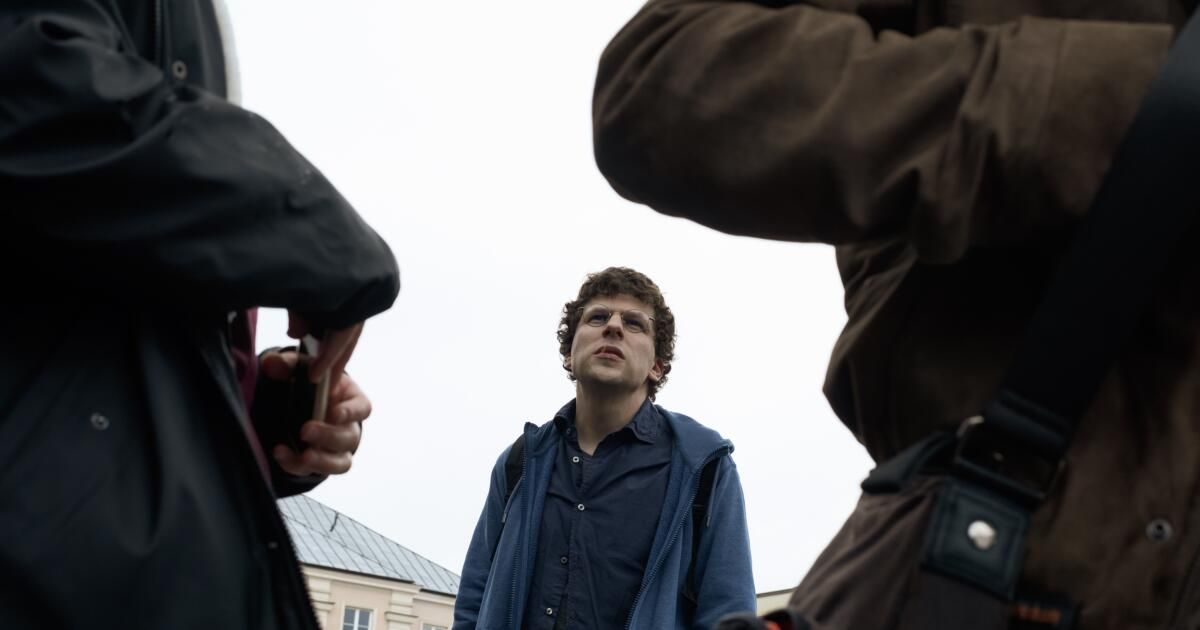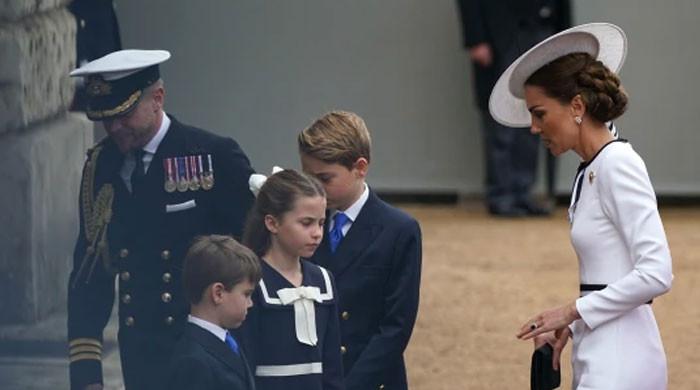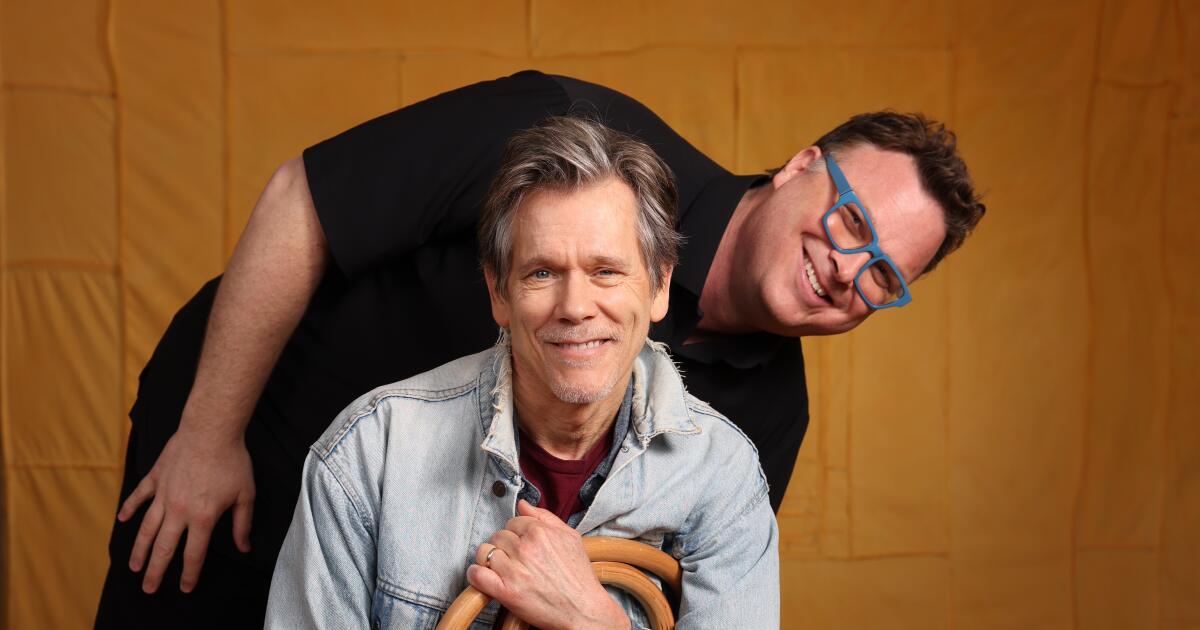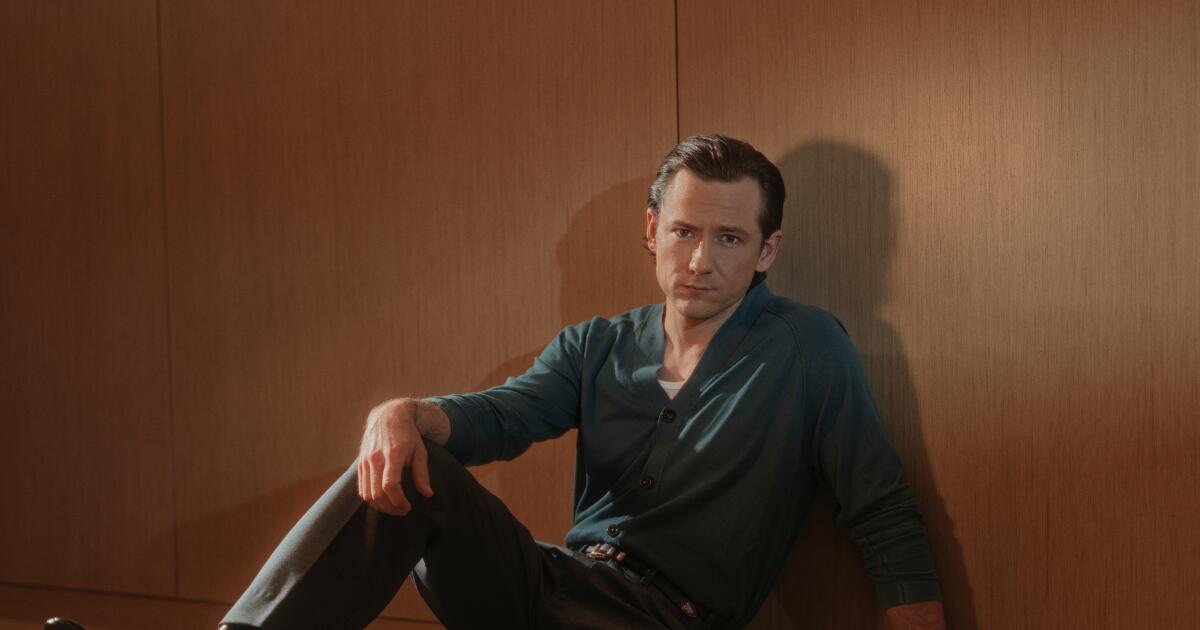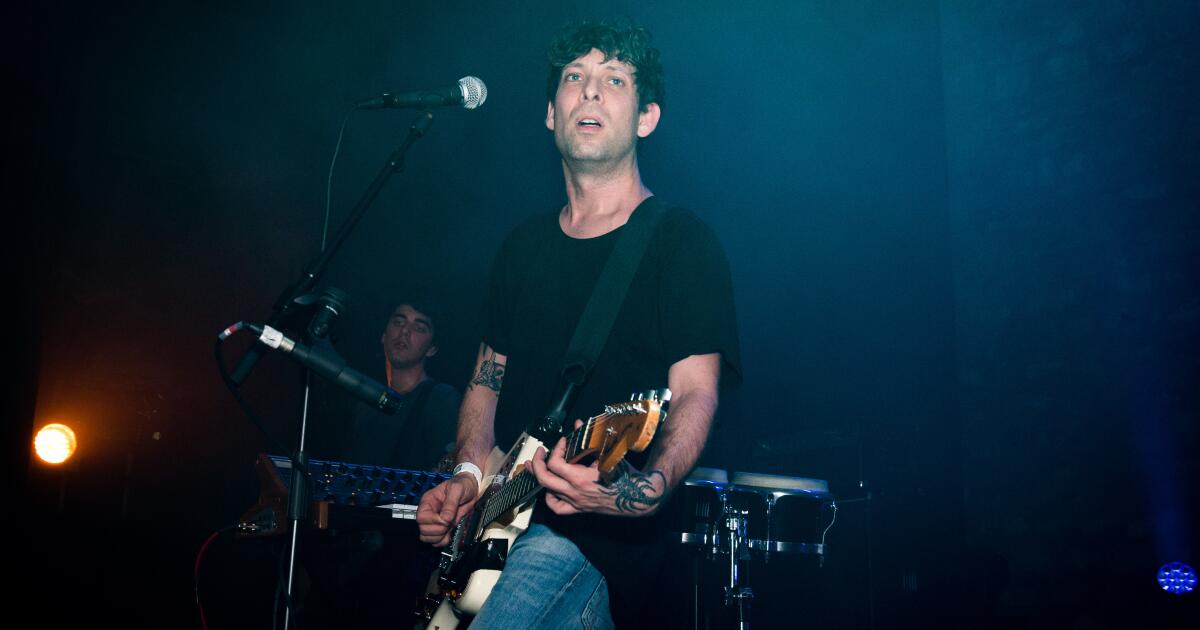It only took one parenthetical sentence in an online ad to highlight the disparate ideas Jesse Eisenberg was putting together while writing what would become his second feature as a director, “A Real Pain.”
It was an advertisement for a Holocaust tour that included the phrase “with lunch” in parentheses.
“And I thought that’s what these two characters should be doing,” Eisenberg explains, his cadence increasing as his mouth tried to keep up with his brain. “They should be doing a Holocaust tour — basically a suburban middle-class American Holocaust tour. You can put these guys who are going through their own existential and interpersonal struggles in the context of a real historical tragedy. And now you have a movie that can support these kinds of issues because it can be supported by something much bigger.”
As Eisenberg speaks, he often stops, rewinds, and restarts a sentence, as if there is a pencil in his mind editing his dialogue as he speaks.
“And you can also make comments about tragedy tourism and how you want to visit a concentration camp during the day, but stay in a Radisson [hotel] “At night,” he continues. “And the irony of travelling by train and sitting in first class to go to a concentration camp where literally your ancestors would have been herded into cattle cars and half of them would have died on the way to that very camp.”
Told with a serious and comedic touch, “A Real Pain” (in theaters Nov. 1) explores the true depths beneath petty family squabbles and minor concerns in the face of major tragedies and emotional maelstroms, with a sensitive eye for both acute detail and the big picture.
Eisenberg plays David, a married New Yorker with a young son and a mid-level advertising job. He and his cousin Benji (played by Kieran Culkin in a vibrant, moving performance) were like brothers when they were young, but grew apart in adulthood. Benji, a talkative drifter, never quite found himself — at least not by David’s standards. After their beloved grandmother dies, they travel to Poland to visit historic Holocaust sites, see their family’s former home, and reconnect in ways neither of them could have anticipated.
To discuss “A Real Pain,” Eisenberg recently joined a Zoom call from Hungary, where he is filming the third film in the hit “Now You See Me” franchise, in which he stars as part of a group of criminal magicians. (“It’s going well and it’s quite different from the movie we’re talking about,” Eisenberg reports.)
“A Real Pain” brings together a number of personal and professional threads for the actor. Eisenberg once told his great-aunt, with whom he was very close, that if he ever made a movie in Europe, he would visit his family’s old home in Poland, where she lived as a child. So in 2008, while filming “The Hunting Party” in Bosnia, he traveled there.
“My wife and I went to see pretty much every single thing the characters do in the movie,” says Eisenberg, 40.
That experience, which included meeting cousins who still live in Poland, was the inspiration for Eisenberg’s 2013 play “The Revisionist,” in which he starred alongside Vanessa Redgrave, exploring many of the same themes as what would become “A Real Pain.” He also wrote a short story, “Mongolia,” published in Tablet magazine in 2017, about two boys who travel together and have an existential crisis.
Filtering all of that through the character of Benji gave Eisenberg exactly what he needed.
“I could play a character who is a kind of ruthless nihilist, and I would constantly call him out for his hypocrisy,” Eisenberg says. “And I thought that was the perfect setting for a feature film.”

Kieran Culkin and Jesse Eisenberg in “A Real Pain,” written and directed by Eisenberg.
(Images by Searchlight)
When “A Real Pain” premiered earlier this year at the Sundance Film Festival, it was acquired by Searchlight Pictures for $10 million, won the Waldo Salt Award for best screenwriter and was met with near-unanimous praise. That was a big shift from Eisenberg’s previous film as writer-director, “When You Finish Saving the World” (2022), which left many viewers cold in its depiction of the fraught relationship between a mother and her teenage son.
Eisenberg recalls that while editing his first film, he showed it to a high-profile editor, who subsequently called him in and yelled at him for over an hour about his characters and story never being allowed in.
“I realized that this was probably going to be a recurring theme,” Eisenberg recalls. “I could tell. The certainty with which he gutted me told me that this wasn’t going to be an isolated opinion.”
So when he set out to write his next project, he took that feedback into account.
“I started out with the explicit intention of creating characters that were more relatable and sympathetic,” Eisenberg says. “I probably would have done something a little more caustic.”
Eisenberg made sure to learn the lessons of his first film as he prepared to make his second. “I learned, but not necessarily what to do better,” he says. “What I learned is what the audience is open to. And for me, my first film is exactly what I wanted to make. And the fact that a lot of people didn’t like it surprises me as much as the fact that people liked this new one.”
Both of Eisenberg’s films were produced by Fruit Tree, the production company run by Emma Stone, her husband Dave McCary and producer Ali Herting. Eisenberg and Culkin met when Culkin was dating Stone and went to visit the production of the 2009 horror comedy “Zombieland,” in which Stone and Eisenberg co-starred.
“I remember thinking, in all honesty, ‘Wow, this is the nicest actor of my generation,’” Eisenberg says, “because when I first met him, he had seen me in ‘The Social Network,’ and he had said this really nice line. And I remember thinking, ‘My God, it’s so weird to have a colleague give you such an unselfish compliment. ’”
While writing “A Real Pain,” Eisenberg initially thought he would play the role of Benji, but his producers convinced him that the emotional extremes of the character might be too much while he was also directing. It was his wife and sister who suggested Culkin for the role.
Speaking by phone from Brooklyn (on his way to a screening of the film), Culkin recalls that it is one of the few scripts that made him laugh out loud when he first read it. And that he also recognized Benji's behavior.
“He’s exactly like someone I know,” says Culkin, who will soon turn 42. “How did he get into that guy’s head? One comment I’ve heard from people who’ve seen the movie is, ‘Oh, I have a Benji in my life. ’ I say, ‘Do you know him, too? Is he just like mine? ’”
When Culkin and Eisenberg met to promote the film at Sundance, the dynamic between them was strikingly similar to that between Benji and David, in that there was deep affection and respect, but also an irritating undercurrent. They both knew exactly how to drive each other crazy.
“When we started working, we just clicked right away, something clicked right away,” says the “Succession” star. “We really got to know each other by being these characters and wanting to make this work.”
“Kieran has a natural ability to endear himself,” Eisenberg says. “I told him on the second or third day of shooting that you hear all these horrible stories about lecherous directors falling in love with their young ingénues, and I’m like, ‘I feel like I’m feeling that for you. You’re the most adorable, brilliant, charming, interesting, enigmatic, evil but also sweet and sassy but pathetic character. ’ And he just projects all of that because he’s one of those people who is totally in touch with himself.”
As David and Benji set off on their journey with other tourists (the film’s cast includes Will Sharpe as their guide and Jennifer Grey, Daniel Oreskes, Liza Sadovy and Kurt Egyiawan as their traveling companions), they eventually arrive at the Majdanek concentration camp in Poland — a deeply moving sequence in the film. (Some of the film’s Polish producers and crew also worked on Jonathan Glazer’s Holocaust drama “The Zone of Interest,” which was filmed at Auschwitz.)
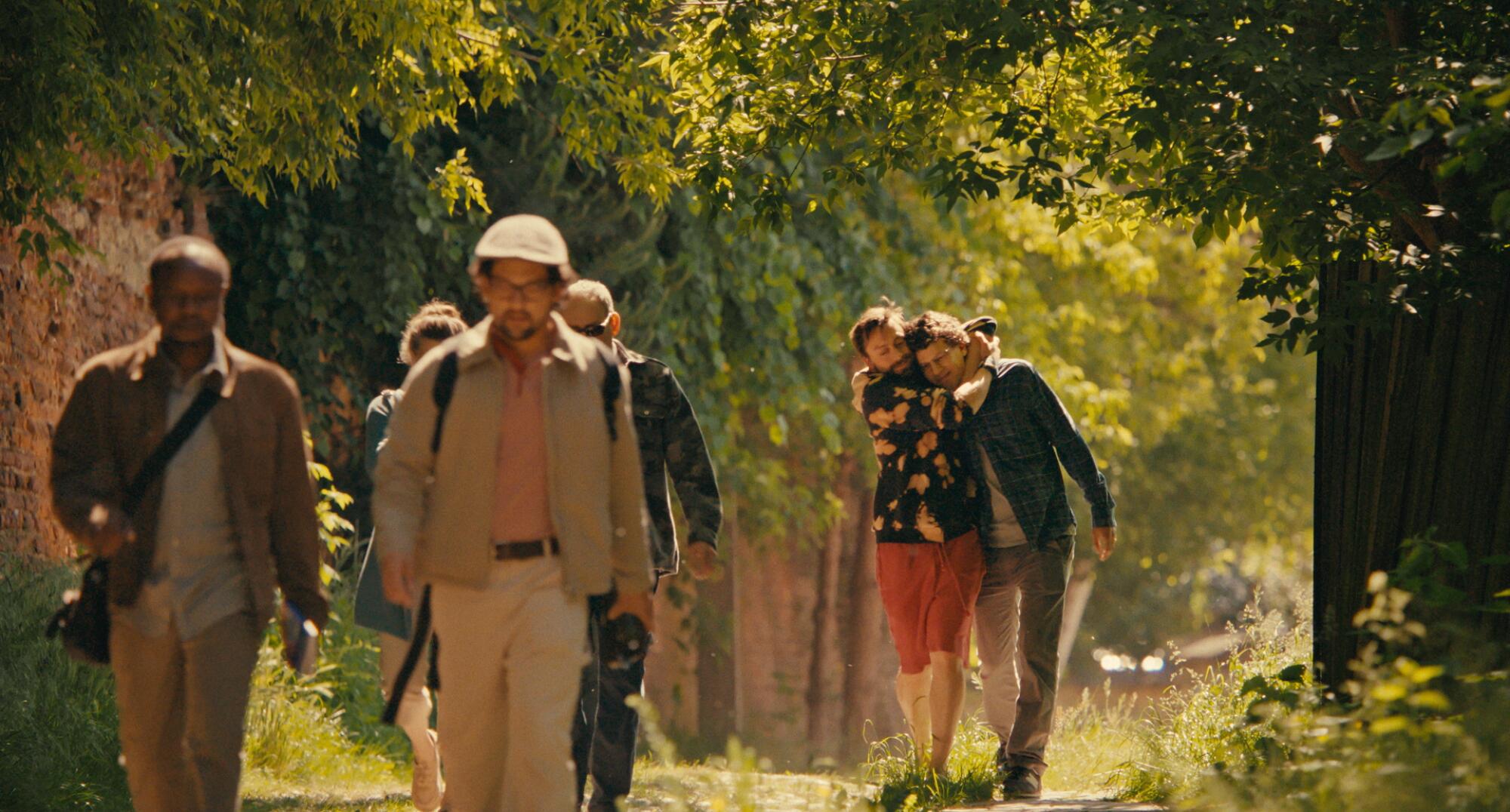
On the right, Culkin and Eisenberg in “A Real Pain.”
(Images by Searchlight)
Once the production was able to secure permission to film in the camp, the practicalities of making a movie began. How will the lighting chief run the cables to power the lights for filming inside a gas chamber? Where will the actors get their hair and makeup done? Where will the crew eat lunch?
“It's something I never thought I'd be thinking about or witnessing,” Eisenberg says. “And everyone is incredibly reverent. They're Poles. This happened in their homeland. They've grown up being incredibly reverent about this history.
“And I had the simultaneous feeling that it was very strange that we were trying to think of practical cinematic applications for this place of great historical tragedy. And then I thought, 'Wait a minute, this is the most beautiful thing, that this Polish team is trying so sweetly and generously to find ways to make my imagination a reality, to honor my family.'”
Eisenberg goes on to review his thoughts and feelings until he comes to an understanding: “And how beautiful it is that we are doing here, that it will tell a story and show a place that many people now don’t believe existed. And so it became, for me, a really amazing gift that I received both from the people who worked there and from this Polish crew who had to go to this very uncomfortable place for a day of shooting.”
Perhaps the film’s greatest achievement is that it alternates between two cousins who are angry at each other and contemplate the enormity of a global tragedy. “A Real Pain” constantly exists on a relatable scale. In that sense, that is in fact Eisenberg’s own son, Banner, who is briefly glimpsed as David’s son at a few points throughout the film. Their onscreen FaceTime conversations revolve mostly around the boy’s obsession with building heights.
“That was like four obsessions ago,” Eisenberg says, noting that her son’s interests have since shifted toward cooking and magic.
Once production on “Now You See Me 3” wraps, Eisenberg will move on to direct another film of his own, also produced by Fruit Tree, based on his play “Happy Talk,” another examination of cross-cultural dynamics. And while there is another role for his son, Eisenberg says, “He knows he’s going to have a minor role in my next movie and he’s already, I would say, a little bitter.”
As “A Real Pain” so gracefully explores, with family, there’s always something going on.

